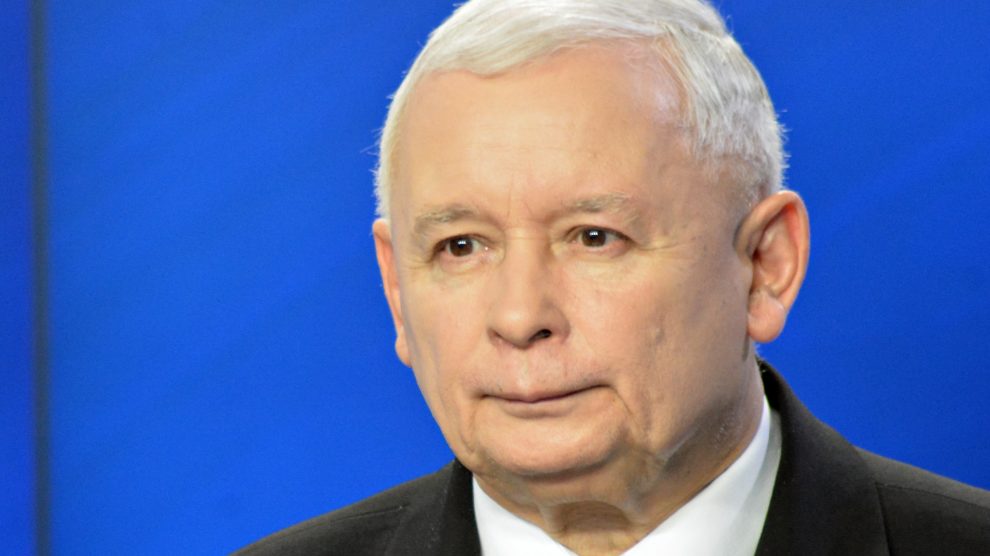He’s not a bad man. Just a sad man. Living alone, with his cat. Once a charming man, so they say. The death of his twin brother in a 2010 plane crash was the turning point for Jarosław, they say. As if the words he had been using up to that point – about Poland’s noble past, of heroes and villains – actually came to life, as if his voice took on an inner power that was able to summon the original Katyn, in 1940, literally back into life. The new enemies wore different clothes, of course, but the same spirit of devilishness was there: the leftists and the liberals, with their secular acceptance of ethnic and religious pluralism and sexual equality.
My Polish ex-father-in-law always regretted that his generation had not been part of his parents’ Great Generation, those that fought in the Uprisings and all that. Jarosław is about the same age as Witek and perhaps shares that same sense of missing out, of regret, of survivors guilt, grief by proxy.
Kill the messenger
Then there are the message carriers. Western media loves its demons and the middle classes love to chatter, it being the nature of being middle class: think lawyers, teachers, journalists. So it was when the long-time head of an international news agency asked on Facebook in January 2020 if anyone could recommend books explaining why the world had become so nasty. Poor thing. One can only hope she figured it out before heading off to the Italian ski slopes.
In private they all know each other, the Tusks, the Rostowskis, the Sikorskis, the Kwasniewskis and the news agency chiefs all share the same schools for their kids, the same financial advisors and lawyers. All benefit from a form of liberalism that allowed Poland to escape the command economy at breakneck speed after 1990, but also invited a kind of lazy nepotism that drove and still drives the emergent Polish bourgeousie, all fast money, show, ostentation. Some try and buy class, often for their children via foreign schools, private tutors and so on, while others import it in the form of English brogues, the shoes and the accent. Both the liberal centre-right and the liberal centre-left played the game of embourgeoisement for themselves, while apologising for Poland’s historical guilt, in particular anti-Semitism in places like Jedwabne.
This is a clique that tends to confuse its own ambition and power with what is good for some ill-defined national interest, but a nation with a ‘nigger-like mentality,’ as Sikorski put it. Radek Sikorski, Boris Johnson’s fag at Eton, or Oxford, or both or neither, depending on which source you believe, imitates the master clown in his manners, his social aspirations, his casual racism, even his stilted, stiff style of talking, so tightly buttoned up he is more English gentleman than most English gentlemen.
Which brings to mind Jane, from a German news agency I worked at. All the worst elements of Englishness rolled into a single person. Her snobbishness and her exclusiveness went some way to helping me understand the social psychology of Brexit. Why would a normal Brit put up with such a disaster of a human being, one for whom all things ‘posh’ (wine, classical music etc) were the preserves of the ‘better’ social classes. That somehow the plebs were not sufficiently evolved to grasp or enjoy them. It was like a vision of 1950s suburban England, when a bottle of wine cost a day’s wages, coffee was decidedly ‘continental,’ ‘father was always right,’ and France was about as exotic as you could imagine. Jane had escaped but carried that world around with her.
Back to the future
But we live in a world of seemingly perpetual change, of automation, of mass migration, of rising temperatures and sea levels, of lost job security and often meaningless work. It is probably far from surprising then that we revert to the certainties offered by traditional discourse, of religion, of home, of us and not us, of what is right and wrong. The recalibration means stepping back into a world where the language seemed to fit the epoch, like Jane’s 1950 Esher.
Then there are the proles. A working class that doesn’t believe in socialism by name, but likes many of its less tolerant aspects, like obedience to collective norms and their punitive reinforcement, with a patriotism the left has always had a problem with.
In the Polish case, it is the patriotism of PiS that has caught the votes of those many of whom are church-goers and afraid of change, or afraid of foreigners. The Church is the production line, up stream the raw product, PiS packages it and sells it down stream.
Poles on the ground are often very different from those one finds in the text books: there is that overriding public display of rudeness, arrogance and vulgarity and obsession with winning at all costs, playing the system, materialism and show.
Poland is in that no-man’s land, no longer officially developing, but not quite developed and it still wants the EU funds. This contradiction was often seen in private Poland: we want to be treated equally, but we will always cry disadvantage when we lose. In fact we still think in private that we are better than you. Terrible ignorance combined with terrible arrogance in a small self-referential village atmosphere.
From this perspective, it is easy to see how Kaczynski thrives here. He, like Trump and Farage, plays on the sense of being an outsider, unable to speak like ‘the elites,’ casting himself as the underdog. See how Trump is laughed at by the comedians. He can’t read, he can’t write, he eats Big Macs for breakfast, they scoff. Jarosław articulates a Poland that is far closer to the Poland I experience than the one I read about in The Economist or Gazeta Wyborcza. It’s often not very pretty, but it does feel real.

